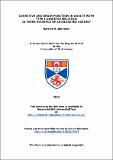Files in this item
Cognitive and brain function in adults with Type 1 diabetes mellitus : is there evidence of accelerated ageing?
Item metadata
| dc.contributor.advisor | Astell, Arlene Jean | |
| dc.contributor.author | Johnston, Harriet N. | |
| dc.coverage.spatial | 384 | en_US |
| dc.date.accessioned | 2013-03-28T10:54:08Z | |
| dc.date.available | 2013-03-28T10:54:08Z | |
| dc.date.issued | 2013-06-25 | |
| dc.identifier.uri | https://hdl.handle.net/10023/3446 | |
| dc.description.abstract | The physical complications of Type 1 diabetes mellitus (T1DM) have been understood as an accelerated ageing process (Morley, 2008). Do people with T1DM also experience accelerated cognitive and brain ageing? Using findings from research of the normal cognitive and brain ageing process and conceptualized in theories of the functional brain changes in cognitive ageing, a combination of cognitive testing and functional magnetic resonance imaging (fMRI) techniques were used to evaluate evidence of accelerated cognitive and brain ageing in middle-aged adults with T1DM. The first part of this thesis comprises a cognitive study of 94 adults (≥ 45 years of age) with long duration (≥ 10 years) of T1DM. Participants completed cognitive assessment and questionnaires on general mood and feelings about living with diabetes. Findings highlighted the importance of microvascular disease (specifically retinopathy) as an independent predictor of cognitive function. The incidence and predictors of mild cognitive impairment (MCI) were then explored. Results indicate a higher percentage of the group met criteria for MCI than expected based on incidence rates in the general population, providing initial evidence of accelerated cognitive ageing. Psychological factors were explored next. The relationship between the measures of well-being, diabetes health, and cognitive function highlighted the need for attention to patient’s psychological well-being in diabetes care. Finally, a subgroup of 30 participants between the ages of 45 and 65 who differed on severity of retinopathy were selected to take part in an fMRI study. Blood oxygen level dependent (BOLD) activity was evaluated while participants were engaged in cognitive tasks and during rest. The findings provided evidence that the pattern of BOLD activation and functional connectivity for those with high severity of retinopathy are similar to patterns found in adults over the age of 65. In line with the theories of cognitive ageing, functional brain changes appear to maintain a level of cognitive function. Evidence of accelerated brain ageing in this primarily middle-aged group, emphasizes the importance of treatments and regimens to prevent or minimize microvascular complications. | en_US |
| dc.language.iso | en | en_US |
| dc.publisher | University of St Andrews | |
| dc.subject | Type 1 diabetes mellitus | en_US |
| dc.subject | Microvascular disease | en_US |
| dc.subject | Cognitive function | en_US |
| dc.subject | Brain function | en_US |
| dc.subject | Cognitive ageing | en_US |
| dc.subject | Brain ageing | en_US |
| dc.subject | Functional Magnetic Resonance Imaging | en_US |
| dc.subject | Functional connectivity | en_US |
| dc.subject | Mild cognitive impairment | en_US |
| dc.subject | Psychological well-being | en_US |
| dc.subject | HbA1c | en_US |
| dc.subject | Adults | en_US |
| dc.subject | Depression | en_US |
| dc.subject | Anxiety | en_US |
| dc.subject | Retinopathy | en_US |
| dc.subject | Hypoglycaemia | en_US |
| dc.subject | Diabetes well-being | en_US |
| dc.subject | Self-management | en_US |
| dc.subject | Resting state | en_US |
| dc.subject | Accelerated ageing | en_US |
| dc.subject | BOLD | en_US |
| dc.subject | Physical health | en_US |
| dc.subject | fMRI | en_US |
| dc.subject | Insulin resistance | en_US |
| dc.subject.lcc | RC660.J7 | |
| dc.subject.lcsh | Diabetes | en_US |
| dc.subject.lcsh | Brain--Aging | en_US |
| dc.subject.lcsh | Mild cognitive impairment | en_US |
| dc.subject.lcsh | Microcirculation disorders | en_US |
| dc.subject.lcsh | Magnetic resonance imaging | en_US |
| dc.title | Cognitive and brain function in adults with Type 1 diabetes mellitus : is there evidence of accelerated ageing? | en_US |
| dc.type | Thesis | en_US |
| dc.contributor.sponsor | Scottish Imaging Network (SINAPSE) | en_US |
| dc.contributor.sponsor | University of St Andrews | en_US |
| dc.contributor.sponsor | University of Dundee, Ninewells Hospital and Medical School, Anonymous Trust | en_US |
| dc.type.qualificationlevel | Doctoral | en_US |
| dc.type.qualificationname | PhD Doctor of Philosophy | en_US |
| dc.publisher.institution | The University of St Andrews | en_US |
| dc.publisher.department | University of St Andrews School of Psychology and Neuroscience | en_US |
| dc.publisher.department | University of Dundee Ninewells Hospital and Medical School | en_US |
| dc.publisher.department | Ninewells Hospital and Medical School Clinical Research Centre | en_US |
This item appears in the following Collection(s)
Items in the St Andrews Research Repository are protected by copyright, with all rights reserved, unless otherwise indicated.

